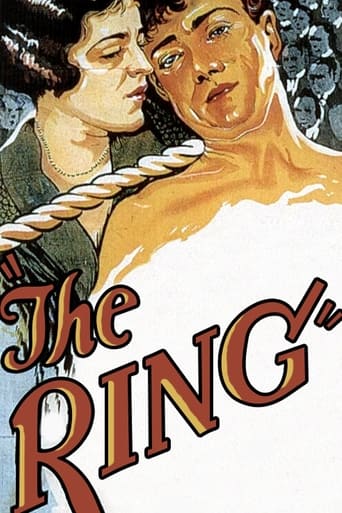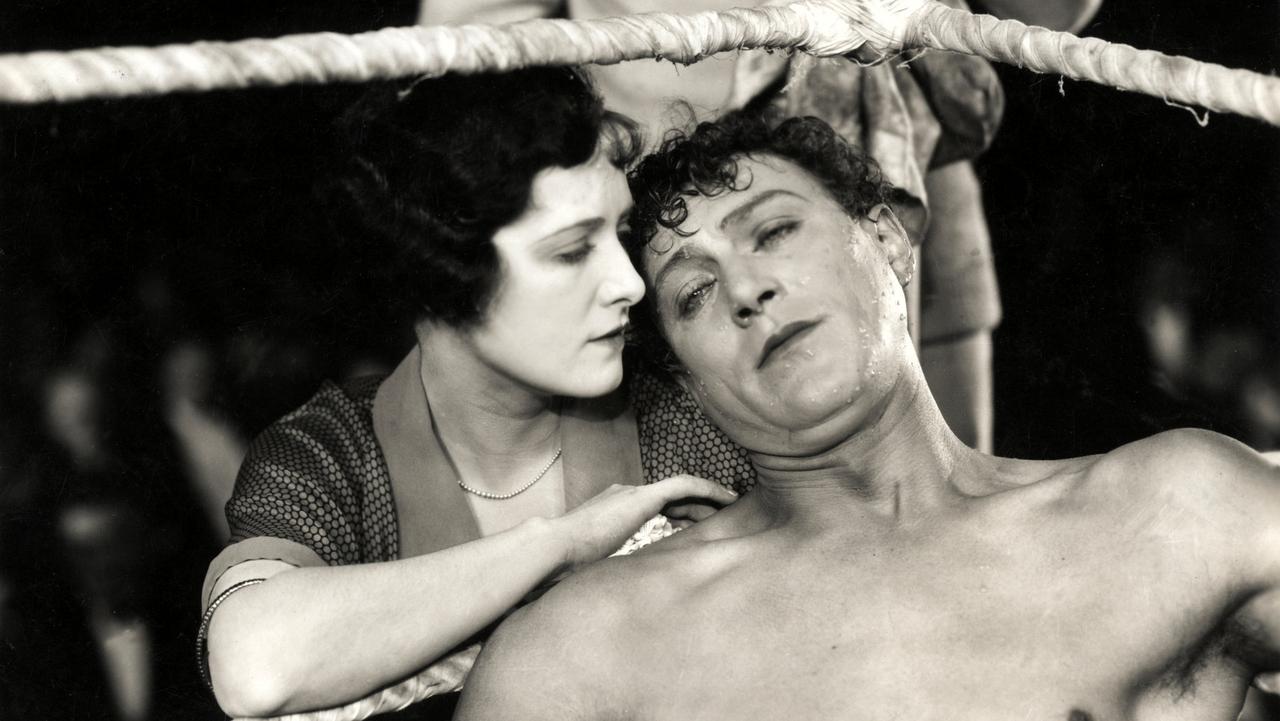Rainey Dawn
The story of "The Ring" I personally found boring for most of the film. A love triangle: one woman and two boxers that end up duking it out over her. She was rather bored in her marriage as I was bored with this film. It surprises me that the story was rather a snore because Alfred Hitchcock not only directed it but wrote it.There are a couple of scenes I got a giggle out of and a really dramatic scene about an hour into it - good scenes when the husband has found out about his wife cheating and he confronts her, ripping off the shoulder of her dress revealing her slip top and then he grabs and rips off the upper arm bracelet that she is concealing that her lover gave her. Then the husband goes out to find the man.What is good about the film is the cinematography and editing - it's a great early Hitchcock directing piece.3/10
Syl
Sir Alfred Hitchcock was an absolute genius who knew what audiences wanted long before groups and screenings. This film is about a boxer, his girl, and the boxing world. One reviewer pointed out that he avoided too many cards to say what was going on in the film. The audiences would have to use their imagination and work at it. The cast is fine but I prefer "The Lodger" because it was more intense. This film was a fine effort in establishing Hitchcock's genius. The cast was fine but maybe the writing could have been better. I think this film is one of the earliest films about boxing as a sport long before films like "Rocky" and "The Fighter" won awards. This film might be the pioneer of boxing films.
jennyhor2004
An early triumph for the young Alfred Hitchcock, released in the same year as his better known "The Lodger: A Story of the London Fog", the boxing film "The Ring" deserves its own accolade as one of his more technically accomplished films from the silent movie era. Already the film features much symbolism in its name alone: there is the obvious reference to the boxing ring but the title also refers to a wedding ring, a bracelet and the love triangle that is the movie's heart. Themes familiar to Hitchcock fans are not so much in evidence here and the major attractions lie in Hitchcock's increasingly confident use of editing, montage, the camera as voyeur and development of character through action and emotion.Jack Sander (Carl Brisson) works his way up as a boxer from fighting amateurs at country fairs to professional level. His main ambition is to succeed at boxing and earn enough money to marry the cashier Mabel (Lillian Hall Davis). However Mabel meets another boxer, Bob Corby (Ian Hunter), and falls in love with him. As Sander wins his bouts, he marries Mabel and continues to fight but gradually discovers his wife is still attracted to Bob. He vows to keep on fighting to a level where he can seriously challenge Corby. Eventually the match is arranged and everyone in town turns up to watch the match. Can Gander beat Corby and win back Mabel? Who will Mabel choose?The story is hokey in its details but Hitchcock was more interested in the love triangle and the characterisation of Mabel, the most developed character, than in portraying boxing as a career in the 1920s. It's a given in many of Hitchcock's films that the main female character should be the most complex of the cast, no matter what the plot, and "The Ring" is no different here. Mabel is torn between the shallow, fun-loving life-style that Corby as an established professional boxer can offer her and the plainer, down-to-earth and genuine life that is Jack's to give. The inner conflict that Mabel experiences is most vividly expressed in the climactic boxing scene where she is seen racing from Corby's side to Jack's side and back again. Hall Davis is quite effective as Mabel and has a lovely beauty in several shots. Unfortunately her career in films was short-lived; the arrival of talkies cut short her success and she committed suicide in 1933. Brisson brings to his role an imposing physical presence and height, and experience as an amateur boxer; he's not much of an actor but he has a frank and open sincerity that makes him perfect as a wronged man. Ian Hunter as Corby hasn't much to do apart from playing suave and seductive; he was to have a long film career that lasted nearly 40 years.The film shows German Expressionist influences in a number of scenes and although the plot can be quite involved, it is skilfully relayed so as to rely on very few titles cards and the flow of the narrative is not disrupted as a result. Throughout his career, Hitchcock never forgot his roots in silent film and a number of his later movies, even famous ones made in the late 1950s and early 1960s like "Vertigo", "North by Northwest" and "Psycho", feature extended scenes where nothing is said. The boxing scene where Sander and Corby settle their differences once and for all uses clever edits and a dream-like sequence simulating the effect of slight concussion to draw out and heighten the inner and outer conflicts of the two men: they are fighting not only for their reputations and careers, they are fighting for the love of a woman. There are scenes throughout the film where the camera is used as a voyeuristic device that lets us see how the rivalry between Sander and Corby develops and escalates.It is a slow film in its first half and doesn't accumulate pace and tension until Mabel's adultery with Corby becomes overt and Sander's anger at her betrayal threatens to get the better of him. Minor characters such as Sander's trainer provide light relief and pause in the tension. Overall "The Ring" is recommended to Hitchcock fans to see how their favourite director was refining his signature style.
Robert J. Maxwell
Ian Hunter was later to be King Richard the Lionheart in Errol Flynn's "The Adventures of Robin Hood." Here, he's the heavyweight champion. Just for the heck of it, and because he was taunted by the girl (Hall Davis) who takes tickets, he gets into the ring with "One Round" Jack (Brisson), a carnival nobody who makes a meager living fighting all comers. The ticket-taking young lady is Brisson's girl friend.Hunter decks Brisson, as is expected, but the bout forms a certain bond between them. Hunter's win also attracts the attention of Hall Davis. Gee, a genuine champion! Hunter slips her a bracelet bought with his winnings from the bout.Brisson then finds a manager and begins professional boxing. He marries Hall Davis in a comic scene. Hitchcock handles the scene with some deftness. An insert shows us Brisson's hand slipping the wedding ring onto Hall Davis's finger, but the bracelet from Hunter slides down her arm and confuses the simple event.Brisson works his way up to the top and finally wins the match that will get him a title shot against Hunter. He returns home to find his pals ready to celebrate with him -- but no wife. She's out schtupping Hunter. The champagne goes flat while everyone waits for her return. One by one, the Brisson's glum buddies take their leave. Brisson has by the time caught on to the situation. When Hall Davis finally returns there is an angry exchange and Hall Davis leaves him, feeling insulted.The night of the big fight arrives and it's exhausting. Brisson takes a pounding from Hunter. Just when it seems he can't get through another round, guess what happens. Hall Davis arrives, changes her mind, and rushes to Brisson to tell him, "I'm in YOUR corner, Jack!" That signal Hunter's KO. Happy ending.It's a bit slow and torpid at the start but after twenty minutes or so, I found myself caring what happened to the characters. They're pretty well written. Hunter isn't an evil guy, just careless about the feelings of others and used to having any girl he has a yen for. Brisson is the obvious and oblivious protagonist, good natured, committed, naive. Hall Davis is flighty and adulterous but turns out all right in the end.Hitchcock plays some tricks with the camera and seems to enjoy experimenting with the device. We see the world hazy and shimmering through the eyes of a drunken man. It's even worse when we get the POV of Brisson after he's been skinned alive in the ring. One of the camera's capers is unusual. At the bottom of the screen a man's hands are playing the keys of a piano, but the keys extend blurrily all the way up to the top of the screen.It's not a great movie. Love triangles are common and the end is formulaic. Nor is the acting outstanding. I'm not sure what would constitute an outstanding performance in a silent movie, disregarding makeup.You'll probably stay awake through it, but it's not worth repeated viewings.


 AD
AD



